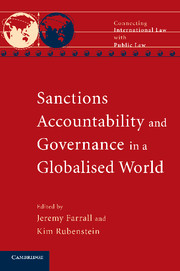Book contents
- Frontmatter
- Contents
- Contributors
- Series editors' preface
- Editors' preface
- Introduction: Filling or falling between the cracks? Law's potential
- PART I Setting down the foundations
- PART II Internationalising public law
- PART III Implementing Security Council sanctions
- PART IV The place of corporations
- PART V The role of lawyers
- PART VI Public law and public policy
- PART VII Parallel case studies
- Concluding remarks
- Bibliography
- Index
Introduction: Filling or falling between the cracks? Law's potential
Published online by Cambridge University Press: 05 October 2010
- Frontmatter
- Contents
- Contributors
- Series editors' preface
- Editors' preface
- Introduction: Filling or falling between the cracks? Law's potential
- PART I Setting down the foundations
- PART II Internationalising public law
- PART III Implementing Security Council sanctions
- PART IV The place of corporations
- PART V The role of lawyers
- PART VI Public law and public policy
- PART VII Parallel case studies
- Concluding remarks
- Bibliography
- Index
Summary
Introduction
Between 1990 and 2003 the United Nations applied comprehensive economic sanctions against Saddam Hussein's Iraqi regime. The sanctions aimed to prevent the flow to and from Iraq of all but the most basic of food and medical supplies. They were heavily criticised for the impact they had on Iraqi civilians. Some critics went so far as to describe the Iraq sanctions as ‘the UN's weapon of mass destruction’, as ‘a genocidal tool’ and as ‘modern siege warfare’. Stung by this kind of criticism, the UN Security Council created the Oil-for-Food Programme (OFFP). The OFFP was designed to permit the closely regulated export of Iraqi oil to finance the purchase of humanitarian supplies.
To a large extent the OFFP did channel essential supplies to a population in desperate need. However, as the Volcker Independent Inquiry Committee concluded, the programme was exploited by the Hussein regime. A number of foreign companies were exposed as having made illegal side payments to the Hussein regime in the course of providing humanitarian supplies to Iraq under the umbrella of the OFFP. One of the worst offenders was AWB Limited (AWB Ltd) and its subsidiary AWB International Limited (AWB(I)).
The abuse of the OFFP by AWB Ltd, which came to be known in Australia as the ‘Wheat-for-Weapons scandal’, raised a number of interesting legal questions. The UN sanctions regime imposed against Iraq created a web of legal obligations for UN member states.
- Type
- Chapter
- Information
- Publisher: Cambridge University PressPrint publication year: 2009



